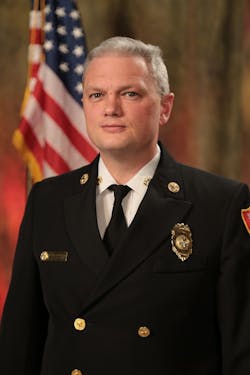Machiavellian Leadership: How Toxicity Can Lead to an Organization’s Demise
We have all been forced to follow a Machiavellian leader; most of us just never realized what we were experiencing and certainly never knew how to deal with them. They can be found in every organization, from the lowest level supervisor up to the fire chief. The paramilitary organizational model that the fire service is founded upon compels those working in the situation to address the leader and the culture for the safety of the personnel and fulfillment of the mission. How one responds to the leader or situation may predict success or failure.
Understanding the personality type
The idea of connecting Machiavellianism principles to fire service leadership starts with the story of Niccolo Machiavelli. Machiavelli was an Italian bureaucrat who wrote the book “The Prince” in 1513. His work essentially created guidelines for leaders to control others through manipulation and deception. Several hundreds of years after Machiavelli’s death, psychologists used his hostile syndromes to label Machiavellian as the character traits of manipulative individuals.
In 1970, studies of Machiavelism led to clarifying Machiavellian personalities as toxic and hostile, with these leaders regarding others as objects or means for personal manipulation.1 Machiavellians are without ethical and moral conviction and believe that they can get whatever they want through manipulation and self-service malevolence. Machiavellian leaders will often use a host of manipulative tools to control the organization, including fear, retaliation and embarrassment (i.e., negative rumors, promotions, “special” assignments). Is it starting to sound eerily familiar?
Many of Machiavellian leaders, especially those with rank, also have narcissistic tendencies and cannot accept failure, errors or lack of respect. Leaders will build an environment around themselves to support their view of power and ruthless desire for success so that strategies like deception, manipulation or intimation become second nature to achieve their illusion. The leaders will control the organizational hierarchy by continually seeking and assimilating power, taking responsibility for successes while blaming others for failures to feed an ever-expanding psychological need for power, adoration and superiority. Eventually, the leaders’ arrogance and irrational decisions lead to situations from which they cannot recover, and the organization becomes sick. The toxicity that even one leader with a Machiavellian mindset can spread is daunting. The eventuality of the ultimate demise of the organization can be seen early by talent leaving, ethical lapses, financial decisions, and eventually, a leadership reset.
Speak truth to power
Often in government and power-based hierarchical organizations, employees simply settle in and wait until change comes from an external force like elections, retirement or a forceful coup that is also frequently political. There are ways to contribute to a solution to avoid dragging the organization and its people through the toxic swamp.
Most fire service organizations rely on the chain-of-command for fireground communication and direction, but for organizational communications, the cultural norms may differ significantly. If the organization requires the chain-of-command for all communications and punishes for going outside of the system for discussions, that is a warning sign of significant dysfunction (but a significant contributor to the problem of control). As an industry, we talk over and over about the fire service family and savor the connection to brotherhood or sisterhood—but speaking about it is different. If we truly believe in the fire service family, then we would communicate openly, all the time, and not rely on filters that determine the message. Organizations that refuse to allow firefighters to talk directly with their fire chiefs likely have, or will have, serious problems. Open discussion does not mean superseding the authority of the supervisor or manager (e.g., firefighter going over the officer’s head to the chief for equipment or trivial business that has a policy or procedure for workflow). The best example of this is the chief stopping by and talking to a crew or listening and engaging the firefighters when something is on their mind. Try this experiment. Invite your fire chief to lunch and see what happens. If you hear new information that the chief communicated down the chain already, or if the supervisor (i.e., battalion/division/deputy chief) gets upset or retaliates in a passive/aggressive manner, there is a big problem.
We all see the world from different perspectives, and it is essential to adopt a way for you to have a professional conversation with another person when there is conflict. There are many ways to have difficult conversations, but the most straightforward way to address conflict or a potentially tricky issue that involves human perspectives is by using the OIC model (Observe, Interpret, Confirm). First, share your observation (“I observed you taking a watch from the patient’s coffee table.”). Next, share how the action was interpreted (“It appeared that you were stealing the watch.”). And finally, confirm that perspective with the other person (“Is that what you were doing?”).
In a healthy, adult environment, the other person will appreciate the opportunity to clarify the issue, (“I can see how that may have looked, but the patient asked that I deliver it to his wife in the family room.”). Note the emphasis is on a healthy organization. The unhealthy organization, commonly ruled by a Machiavellian leader, will rely on rumor, innuendo and other damaging forms of avoidance instead of addressing the person or issue.
With the Machiavelism leader, you must engage him or her with a respectful and honest conversation. Share your perspective on the situation and do it in a way to not assign blame. Using the OIC model, share as many details as possible. Use facts, not opinion, and avoid referencing rumors. Machiavellian leaders thrive on opportunities to exercise power and fear, but do not appreciate ever being challenged with facts. If you avoid even the simplest dialog with the leadership, you are guaranteeing that the dysfunction will continue. Remember silence is concurrence.
You cannot assume that a Machiavellian leader will suddenly wake up and realize the error of their ways. It hardly ever works that way. Rome was not built in a day, and neither will be steering a toxic culture out of an abyss. The confirmation conversation with the Machiavellian leader will be pivotal and future-telling for the organization. If the leader defers responsibility to other teams, regresses to retaliation or personal attacks, or if he or she is indifferent, then there may be no hope.
Of most importance, keep yourself in check and avoid the trap of virulent engagement. The more you can maintain your focus on the organization’s goals, the less likely you are to buy into the winner versus loser reasoning often found with Machiavellian leaders. Personal integrity and character must be the foundation for the outcome you are trying to achieve. Regardless of the outcome, maintain the adherence to a standard that supports collaboration and open communication, not retaliation.
Lastly, take care of your mental and physical health. Machiavellian leadership can damage your emotional and physical health if you let it. In the end, you have to be able to own your actions, release what you have no control of, and possibly make a deliberate move if you can. If the situation does not resolve or gets worse, seek the advice of a human resources professional or mentor.
Final thoughts
When a Machiavellian leader is appointed to a leadership role in a fire service organization, there is no question that people inside the organization and those who are being served in the community will suffer.
Often speaking truth to power must occur to drive change, though rebuilding the relationships take an incredible amount of stamina and courage. The communities we serve expect our very best, and we owe it to each other to accept responsibility and engage the Machiavellian leaders.
1. Kessler, S, Spector, P, Borman, W, Nelson, C, Bandelli, A & Penney, L 2010, “Re-Examining Machiavelli: A Three-Dimensional Model of Machiavellianism in the Workplace,” Journal of Applied Social Psychology, Vol. 40, No. 8, pp. 1868–1896.
About the Author

Brian Schaeffer
Brian Schaeffer is the fire chief for the Spokane, WA, Fire Department. His professional life spans more than 30 years in fire departments in the Midwest and Pacific Northwest. Schaeffer serves on numerous local, state, and national public safety and health-related committees. He frequently lectures on issues that involve innovation, leadership and public safety technology. Schaeffer is a member of the Firehouse Editorial Advisory Board.
